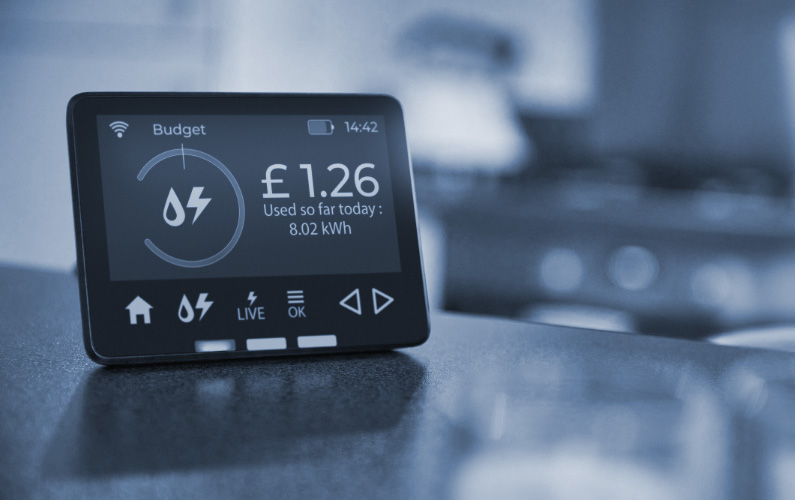- The planned national rollout of smart meters in the UK has been highly controversial, giving rise to heated media debates.
- Our media analysis found that cost-effectiveness emerged as the most pressing issue, while prepayment plans caused a reputational problem for suppliers.
- We also found that the meters’ environmental impact was presented as a double-edged sword, while data privacy generated conspiracy theories on social media.
View a one-page infographic summary of the analysis
Smart meters – electronic devices that record energy consumption information – have generated controversy due to concerns over data privacy, health risks and cost-effectiveness. Despite these issues, proponents argue that smart meters can improve energy management, reduce greenhouse gas emissions, and modernise the energy grid.
In the UK, the planned national rollout, which will see energy suppliers offer smart meters to all homes by the end of 2025, has proved rather unpopular.
To see how the debate unfolded in the media, we analysed 200 English-language articles published in top-tier outlets during the last 12 months. Here are our main findings:
1. Cost-effectiveness emerged as the most pressing issue
Media outlets emphasised the potential savings that smart meters can bring to consumers in the UK, where every home is being offered a smart meter in a multi-billion pound rollout. Journalists focused on how the real-time monitoring of energy usage can help households identify energy wastage, become more energy-efficient, and ultimately reduce their energy bills. This aspect of the conversation often included comparisons of savings achieved by households with smart meters versus those without them.
This is what made Energy costs the largest topic in the debate:
But many publications noted that the rollout has been controversial, with plans afoot to use the devices to charge households more to use power at peak times, with cheaper rates available when demand is lower. They also allow energy providers to remotely switch those who fall behind on bills over to pre-payment meters. Some journalists also remarked that the rollout has been vastly expensive and repeatedly delayed.
Some companies secured positive coverage by offering advice to customers or grants and financial assistance funds. For instance, British Gas emerged as the most influential provider in terms of media impact as it introduced plans to pay customers to cut their electricity use at teatime to avoid blackouts during the winter.
We determine an organisation’s media impact in the context of a topic by looking at its media influence score calculated in terms of coverage by high-profile media outlets, topic relevancy score measuring its contextual relevance, and media visibility as measured by the number of mentions.
Some providers like EDF gained their influence by offering select customers credit to switch to a smart prepayment meter. Others such as Octopus Energy offered a tariff which updates rates every half an hour depending on wholesale prices.
2. Prepayment meters caused a reputational problem for suppliers
Many journalists reported on growing calls for energy suppliers to stop forcibly switching customers who struggle to pay their bills onto prepayment meters. Citizens Advice was quoted as saying the practice should be banned as it saw a sharp rise in clients needing crisis support, such as emergency grants.
People using prepayment meters pay for their gas and electricity by topping up their meter, either through accounts or by adding credit to a card in a convenience store or post office. This is a more expensive method of paying than by direct debit, but is sometimes the only option for people who have struggled to pay and are in debt to an energy supplier.
However, many critics were cited as saying it leaves vulnerable customers at risk of running out of credit and “self-disconnecting” when they cannot afford to top up. This criticism was one of the main reputational challenges for suppliers, as they were portrayed as being out of touch with the most vulnerable parts of the population.
Responding to those issues is what made the boss of British Gas owner Centrica, Chris O’Shea, the most influential spokesperson in the debate:
Chris O’Shea was quoted as saying his company would stop remote switching of smart meters and pledged £10m in support, including non-repayable credit of up to £250 for those struggling the most to top-up their meter.
3. Technological issues drove negative coverage
Many media articles covered technological issues, such as smart meters losing functionality when consumers switch energy suppliers or concerns about the meters becoming obsolete due to advances in technology. The debate also explored the importance of interoperability between different smart meter models and systems.
There were a number of reports about owners of early models who received a nasty shock when they switched energy providers and their modern meter turned “dumb” – rendering it no better than a traditional meter. This was because some “first generation” smart meters became incompatible with the communications network and were unable to send their automatic meter readings.
These issues were perceived as indicative of the problems that have plagued the UK rollout. There were also reports on comical instances of households told they are paying tens of thousands for power. In one case, a homeowner’s home display accidentally showed that he had used £40,000 worth of electricity in a single day. While such stories have been rare, they contributed to smart meters’ reputation for suffering glitches.
Website crashes were also a prominent coverage driver after many of the major energy companies experienced technical failure when customers rushed to submit meter readings. The media reported issues with websites including EDF, British Gas, Shell Energy, E.On, Scottish Power, So Energy and Octopus Energy.
4. Environmental impact was presented as a double-edged sword
A primary argument in favour of smart meters was their potential to improve energy efficiency and reduce the environmental impact of energy consumption.
A significant portion of the media debate revolved around the potential of smart meters to reduce carbon emissions. By helping consumers use energy more efficiently, smart meters could contribute to a decrease in the overall energy demand and, consequently, a reduction in greenhouse gas emissions. Journalists often cited data and projections on the potential impact of smart meter adoption on the UK’s carbon emissions and climate change targets.
But while the environmental benefits of smart meters were generally well-received in the media, some coverage also addressed concerns related to electronic waste (e-waste). Critics argued that the replacement of traditional meters with smart meters generates a considerable amount of e-waste, which can have negative environmental consequences.
5. Data privacy generated conspiracy theories on social media
The media debate around smart meters frequently highlighted concerns that the collected data could be used to build detailed profiles of consumers’ habits and preferences, potentially infringing on their privacy. For instance, some worried that information about when a household is typically empty could be used by criminals to plan burglaries or that data on energy usage patterns could be sold to third parties for targeted advertising purposes.
Another aspect of the data privacy debate was the emphasis on consumer rights and control over their data. The media often discussed the importance of transparency and the ability for consumers to opt-out of data sharing or choose the level of data access granted to third parties. This part of the conversation highlighted the need for a balance between the benefits of data collection and the protection of individual privacy.
Privacy concerns also generated conspiracy theories on social media, as evidenced by some of the most prominent keywords in the Twitter discussion:
Many Twitter users suggested that smart meters are introduced so that the government can exercise digital control and disempower the individual. Others said that the UK would end up like China.
Some users even compared smart meters to vaccine mandates, as both measures were allegedly introduced with the same purpose of taking away people’s liberty.

